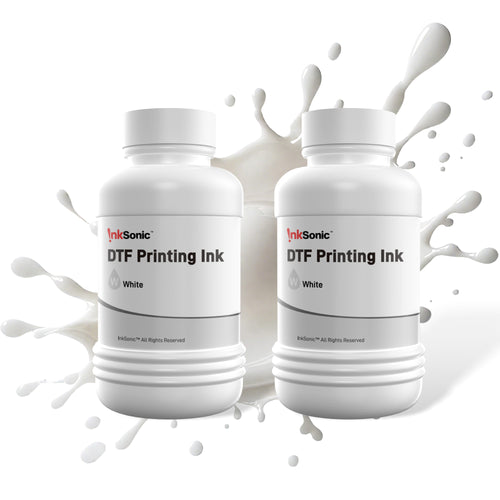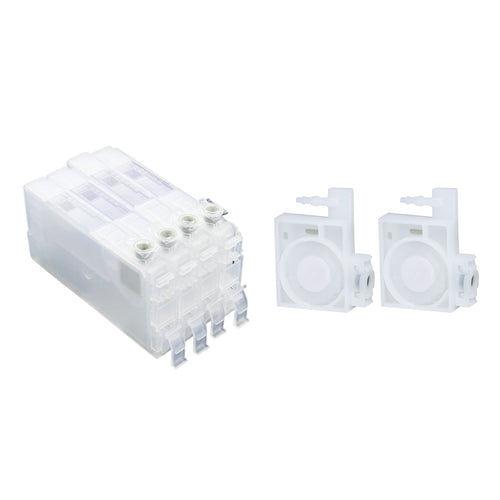InkSonic is a professional manufacturer dedicated to DTF printing machine research and production. With stable hardware, mature process design, and comprehensive technical support, InkSonic has gained the trust of clothing studios, small and medium factories, and cross-border e-commerce buyers from all over the world.


Of InkSonic's lines, XP600 series is most popular and highest quality. With high resolution, reliability, easy maintenance, and customizable settings, it attracts users across the spectrum from amateurs to professional production systems.
Depending on printhead design, the XP600 series comes in two models: XP600 (one head) and Dual-head XP600 (two heads) . While they both possess the benefits of InkSonic, they significantly differ in print speed, control devices, and applications. If either of them appeals to you, the in-depth comparison below will guide you in choosing which one best meets your business need.
1. InkSonic XP600 vs Dual-head XP600 DTF Printer

InkSonic’s two flagship DTF printers—XP600 (single head) and XP600 dual-head DTF printer —both feature Epson XP600 industrial-grade printheads and run on InkSonic’s proprietary control system for stable and user-friendly operation.
Model |
XP600 Single Head |
Dual XP600 Double Head |
Price (reference only) |
$3099 |
$3999 |
Number of Printheads |
1 × XP600 |
2 × XP600 |
Colors |
White, Pink, Yellow, Blue, Gray |
White only (others in development) |
A3 Print Time |
3 minutes |
1–2 minutes |
Resolution |
720×1440DPI – 720×2880DPI |
720×1440DPI – 720×2880DPI |
Weight |
28 kg |
45 kg |
Ink System |
CMYK + WW |
|
2. Is the Dual XP600 Worth It? 6 Key Upgrades That Matter

For users looking to upgrade their DTF printer, the Dual XP600 is definitely worth considering. While it may seem like it just adds one more printhead, it actually comes with comprehensive hardware enhancements—from motors to platforms to ink system architecture. It adopts industrial-grade parts, improving not just speed but long-term reliability and consistent output.
Feature |
XP600 |
Dual-Head XP600 |
Guide Rail |
Standard guide rail |
Aluminum silent high-precision |
Motor Type |
DC motor |
Servo motor |
Capping Station |
Single-head cap station |
Dual independent cap stations |
Ink Pump |
1 |
2 (independently controlled) |
Vacuum Platform |
Standard |
Widened vacuum platform |
Price |
Budget-friendly |
A full-scale industrial upgrade by adding just one more printhead. |
2.1 Dual Printheads = Faster Output
The biggest benefit of a dual-head printer is its dramatically increased speed. One printhead handles white ink while the other manages CMYK, each with 6 ink bags. This true parallel printing setup means faster job completion.
For example, printing an A3 graphic takes 3 minutes on a single-head model but only 1–2 minutes on the Dual-head XP600. If you print dozens or hundreds of jobs a day, this can lead to a significant time (and profit) advantage.
2.2 Upgraded High-Precision Rails = Better Stability and Print Quality
The Dual XP600 upgrades to a high-precision aluminum guide rail. Compared to standard rails, this offers:
Smoother operation even under extended high-speed use
Reduced noise , ideal for office/studio environments
Improved image clarity , especially for small text, gradients, and shadows
2.3 Servo Motors = Smarter, More Stable Drive System
Replacing traditional DC motors with servo motors brings:
Higher control precision
Reduced jitter , leading to more stable prints
Improved durability for heavy-duty daily use
2.4 Widened Vacuum Platform = Flatter Film, Cleaner Prints
The stability of the film paper directly affects the flatness and clarity of the finished product. The dual-nozzle XP600 adopts a widened suction platform design, which effectively improves the adsorption area and fixing ability of the film paper.
Better film adhesion to prevent curling or shifting
Compatibility with larger film sizes
Increased print success rate and fewer reprints
Reinforced chassis improves overall stability and accuracy
2.5 Optimized Ink Stack System = Easier Maintenance, Longer Lifespan
Each printhead in the Dual XP600 has an independent ink stack, allowing:
Separate cleaning/maintenance without interrupting both heads
Better ink control and reduced contamination
Extended printhead lifespan
2.6 Dual Ink Pumps = More Control, Safer Operation
Most DTF printers only use one ink pump. The Dual XP600 has two independent ink pumps, allowing for:
Cleaner ink paths and reduced cross-contamination
Easier diagnostics and maintenance
Improved overall printhead hygiene and stability
3.XP600 or Dual-head XP600? How to Choose the Right One for You
The key isn’t which printer is “better”—but which one aligns with your current production scale and business goals. Here are some guidelines:
When to Choose the XP600 (Single Head):
You're just starting out, with a small studio or low-volume orders
You want something simple, affordable, and reliable
You’re budget-conscious but still want access to high-quality DTF tech
Inksonic XP600 is definitely best DTF printer for small business and beginners. It’s an excellent entry-level choice.
When to Choose the Dual XP600 (Double Head):
You already have DTF experience and need to scale production
You regularly handle bulk orders or detailed, color-sensitive designs
You value speed, long-term stability, and investment in pro-grade gear
4. Conclusion
Dual XP600 isn't just about speed—it’s a full-system upgrade across motors, rails, ink systems, and maintenance features. If you're serious about uptime, productivity, and future-proofing your workflow, this is the smarter long-term investment.
No matter where you are in your journey, InkSonic has a solution for you. We recommend evaluating your current order volume and growth expectations before making a purchase. For more information, product demos, or quotes, feel free to reach out to our team anytime.

































